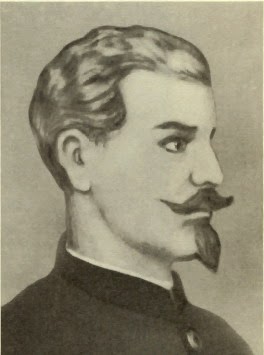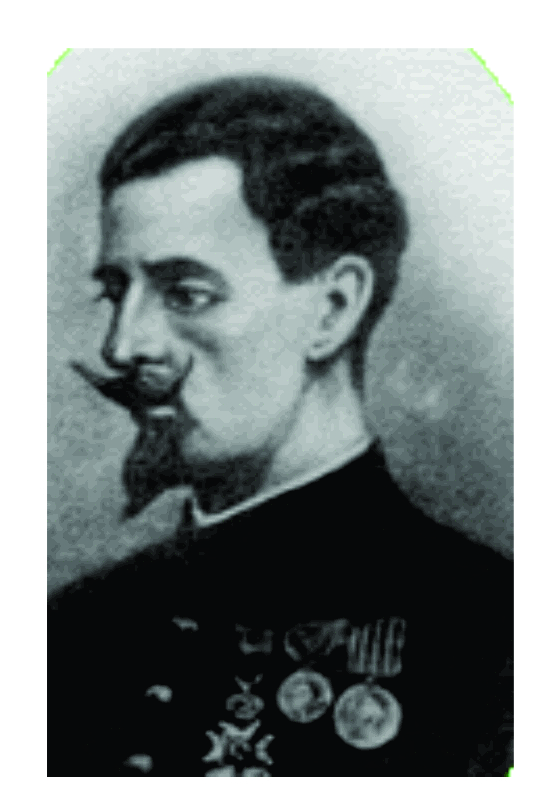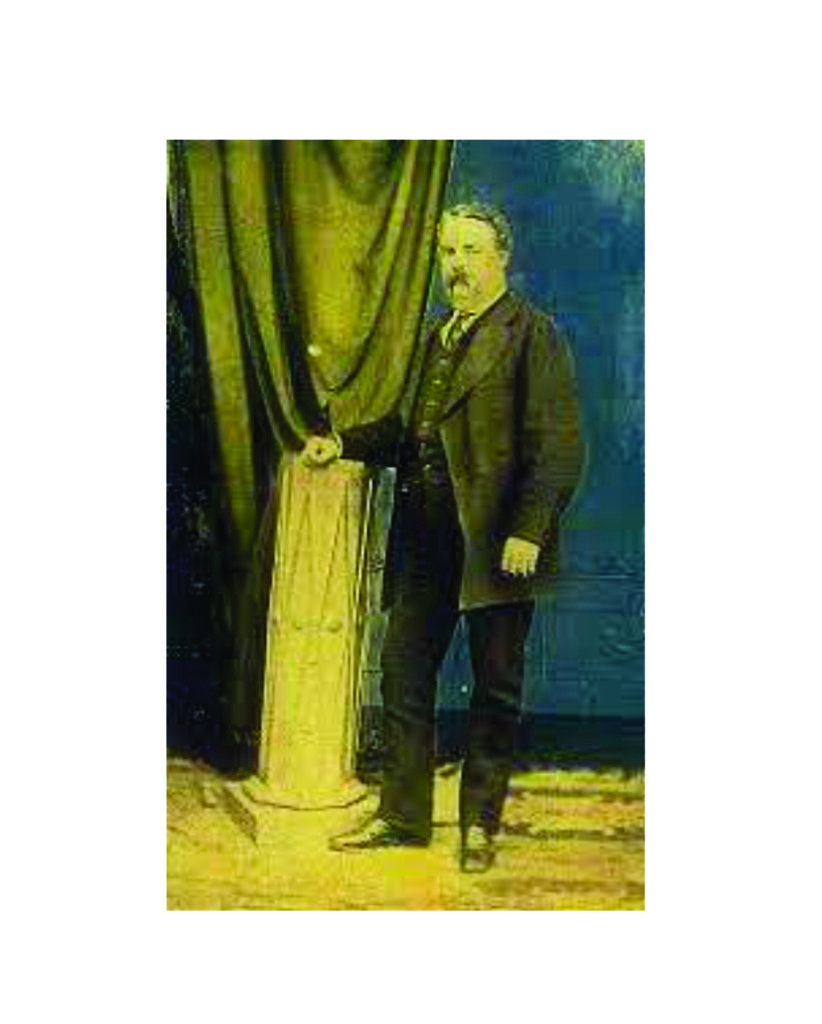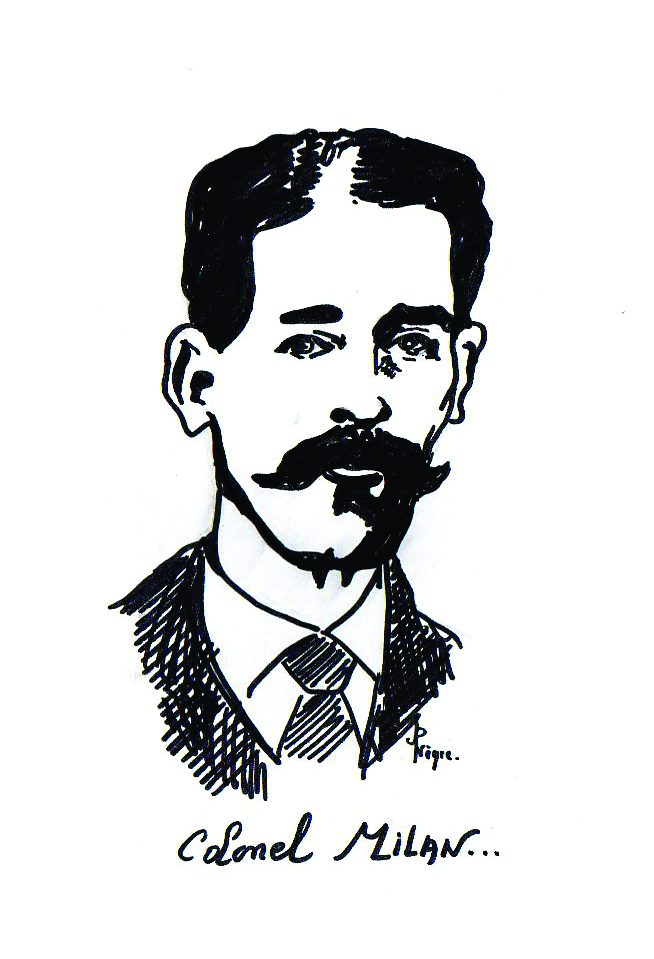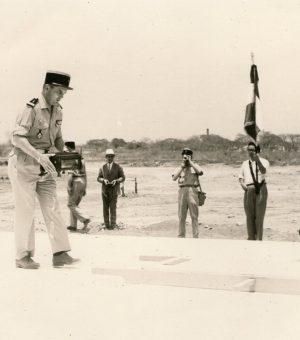La Batalla de Camarón
THE COMBAT OF APRIL 30, 1863, IN CAMARÓN (VER.).
- ORIGINAL TEXT: GRAL M. PÉNETTE AND CAP. J. CASTAINGT -
On the night of April 29-30, 1863, a company of the Foreign Regiment, the 3rd. of the first battalion, under the command of Captain DANJOU and second lieutenants VILAIN and MAUDET, receives the mission of protecting the passage of a convoy of ammunition, weapons and
also transporting three million francs in gold to the troops that besieged Puebla, and heads through Paso del Macho towards Palo Verde.
At seven in the morning, they confronted a cavalry corps from the Center Brigade under the command of Colonel Francisco de P. MILÁN, Governor and Military Commander of the State of Veracruz, who has established his headquarters in La Joya, about two leagues away from the point of Camarón (ex Temazcal, today Villa Tejeda).
After having repelled the first two assaults with a fixed bayonet, Captain DANJOU retreated to a warehouse on the Trinidad hacienda, a league and a half from Palo Verde. Captain DANJOU has the mansion quickly fortified and the walls of the patio, which measures more or less fifty meters on each side, chipped away. The combat begins and from the beginning, it leaves no hope for the besieged, whose chief knows well the old motto of "Square besieged, square taken". And, knowing in advance the fate of his men, he makes them swear to defend themselves to the death.
They all swear.
At ten thirty in the morning, Colonel MILAN sends an emissary, Captain Ramón LAINÉ, from his General Staff. He is the son of a French citizen, and captain of the port of Veracruz. He transmits in French the intimation of Colonel MILAN to the legionnaires to surrender.
Captain DANJOU leaves no hope to the emissary: "We have enough cartridges and we will continue fighting." A few moments later, Captain DANJOU dies and Second Lieutenant VILAIN takes command.
Around noon drums are heard and the legionaries believe that it is a reinforcement coming from Paso del Macho, where Captain SAUSSIER leads a company of grenadiers of the same regiment, camped in the tower that is still called currently the “Fort of the French”.
They are soon disappointed; It is the infantry of the Center Brigade with its National Guard forces from Jalapa, Córdoba and Veracruz and Coscomatepec and corporations from "several indigenous towns." At half past two, second lieutenant VILAIN dies, and command passes to second lieutenant and standard bearer MAUDET, who rejects, a moment later, another surrender summons from the enemy.
The fight continues fierce and strong, the adversaries "lavishing death on each other with fury" and at the end of the day, after a fight that a French historian called a "fight of giants", having sworn to defend himself to the death, his park exhausted, two of its officers dead, the third mortally wounded, leaving a total of 22 dead and 23 wounded on the ground, the 3rd company of the Foreign Regiment succumbs under the superior number of the adversary, after a last attempt to get out with a fixed bayonet causing the opponents considerable losses. The official French combat report mentions the names of two commanders and an officer
Mexicans stood out for the regard they had for the wounded and prisoners; the procedure perhaps unique in the historical military annals, being rather customary to silence the humanitarian traits of the enemy.
It is, it is seen, an episode of reduced magnitude. During the Intervention campaigns, there are other examples of similar actions; and many similar ones will undoubtedly be found in other military campaigns that sparked contests between determined adversaries.
For what reason, then, does history grant this particular treatment? Simply, perhaps, by combining in it each and every one of the essential first fruits of military valor: bravery, the will to win, contempt for
sacrifices, fidelity in the fulfillment of the mission, and feelings of humanity.
How can we not admire with the utmost respect the patriotism and combative spirit of the National Guards and the guerrillas, hastily assembled by Colonel MILAN for this combat of extermination! Assault after assault, wave after wave, the Veracruz patriots crashed against this bastion of irreducible combatants, accepting, to triumph, the loss of hundreds of them, dead or wounded.
Their opponents, the legionnaires, are traditionally an elite troop (often said to be the best in the world). In 1863 they were especially seasoned. Many of them had fought first in Algeria, then in Crimea in 1854, in
Finally Italy in 1859. They were men who knew what fighting means, and if they can resist the first summons to surrender at half past ten in the morning, it is not be the same when at noon they see the National Guard Battalions arrive reinforcing the fence.
They know they are lost. However, no one protests when Second Lieutenant MAUDET, after the death of Captain DANJOU and Second Lieutenant VILAIN, rejects a new surrender summons at half past two in the afternoon. And the combat continues until, at nightfall, the last three valid legionnaires are tamed.
The resistance is definitively annihilated. The continuation of events is particularly moving. Military honors are given to the survivors, of whom, their victor, Colonel MILAN, said: "But they are not men, they are demons!"
Once the wounded were comforted, Dr. Francisco TALAVERA, who throughout that day had headed the Córdoba National Guard Battalion, returned to his vocation as a doctor and healed the wounded who had been collected on the edge of a small reservoir.
In Huatusco, where these wounded are later transported, the population manifests the most vivid feelings of humanity towards them, and Second Lieutenant Clément MAUDET will say before dying, evoking the care of a great lady, a true representation of the Mexican woman:
"In France, I left a mother, I found another in Mexico."
Aftermaths
On the following July 14, in San Juan Coscomatépec, by mutual agreement between the staffs of both sides, the surviving prisoners of the Foreign Legion were exchanged for a Mexican commander, Colonel Manuel M. ALBA. From the legionnaires who were exchanged, it was learned that the troops of Colonel MILAN and in particular Colonel CAMBAS and Captain LAINÉ had treated them very well.
The impression that dominates this warrior episode is the uselessness of the fight, yet the fight continues.
As far as the Mexicans are concerned, once the encirclement has been completed, their tactical objective has been achieved. They have left their adversary totally unable to act. They know that by the mere fact that the hours go by, that dam belongs to them and meanwhile they incessantly continue the assault. The legionnaires, it was already said above, do not keep any hope. Their military honor is safe and no one will be able to judge them severely if they lay down their arms. Yet they fight, quite simply because when you have the honor of wearing a military uniform and a weapon, no one gives up while they can use it.
At this moment, it seems that something like an immense Goddess of Armies was drawn in the clouds of the battlefield, a symbol of this superior notion, "Fidelity to the Mission".
A mission is given; is accepted. Once accepted, it is executed quietly, without tolerating that strange considerations of intellectual or sentimental essence dim the will to comply.
The motive that inspires this fidelity is very different on each side. That of the Mexicans is easy to understand: the adversary is the invader, the one who represents imperialism and absolutism, the one who threatens individual liberties and national independence. The mission of the Mexicans is to harass it, attack it wherever it appears, and destroy it whenever it is opportune and feasible.
For the sake of this great principle and this human engine, freedom, the corpses are
piled up before the walls of the hacienda. The legionnaires' motive seems more difficult to understand. They are in this hell that does not reach one-tenth of a hectare: Germans, Belgians, Swiss, a Dutchman, a Dane, a Spaniard, an Austrian, two Italians, Poles, and French.
Ideologically, what do they care about this military adventure decided by the master of a country that in most cases is not theirs!
Their only moral bond is the promise made to serve with honor and fidelity to a flag under whose folds they have wanted to live, and whose homeland welcomed them generously. And it is in order not to renege on this oath and because they have received the mission of fighting everywhere, until the end, that one by one, in the courtyard of the material house of the Trinidad hacienda, they are falling to the last.
From the still smoking ruins of the patio sheds, when silence finally falls, when the dead are regrouped and the wounded are evacuated, the sublime notion of Fidelity to the Mission emerges, received and fulfilled to the supreme sacrifice, in all the purity of full compliance with duty, in one field as in the other Then, the fame of the hundred mouths takes over the historical fact, beginning with the official consecration. It was decided that the name of the small ranch in the State of Veracruz, Camarón, with its phonetically French spelling "Camerone" by the same
legionnaires will appear before the mention of any other famous battle site on the flag of the First Foreign Regiment and the names of the three officers will be engraved in gold letters on the walls of the Palais des Invalides in Paris, not far from the Napoleon mausoleum.
Later, the Foreign Legion, engaged in other theaters of operations, in France, in the Far East, and in the Indian Ocean, proudly recalls the strong determination of Camarón's sixty-two legionnaires and decides to choose April 30 as a holiday. annual and solemn celebration of his Body. Gradually, when their contracts expire, the legionnaires return to their country of origin, in all parts of the world, taking with them the story of the combat, that of "Camarón's feat", which progressively and imperceptibly becomes a legend.
And it is thus, on April 30 of each year, sometimes in the most remote corners of the Earth, and in Mexico as well, that ex-legionnaires come together, the spirit for a moment detached from material concerns and daily contingencies. , and they gather fervently and silently in a sacred rite: that of "Camerone", that of "Fidelity to the Mission", silent acceptance of the consummation of the supreme sacrifice... And the excitement of the combats calmed and wounds healed, the friendship of two nations and two peoples resurfaces and continues its harmonious development. However, it would be too little to give Camarón's “deed” the character of a fervent and common Franco-Mexican homage to the memory of their heroes. This homage must be shared by all men, from all countries and all times, from the age of the arrow to the modern age, who preferred to lose their lives rather than yield to force... thus preserving the true value of man. , for the wonderful affirmation of the irresistible triumph of spirit over matter.


